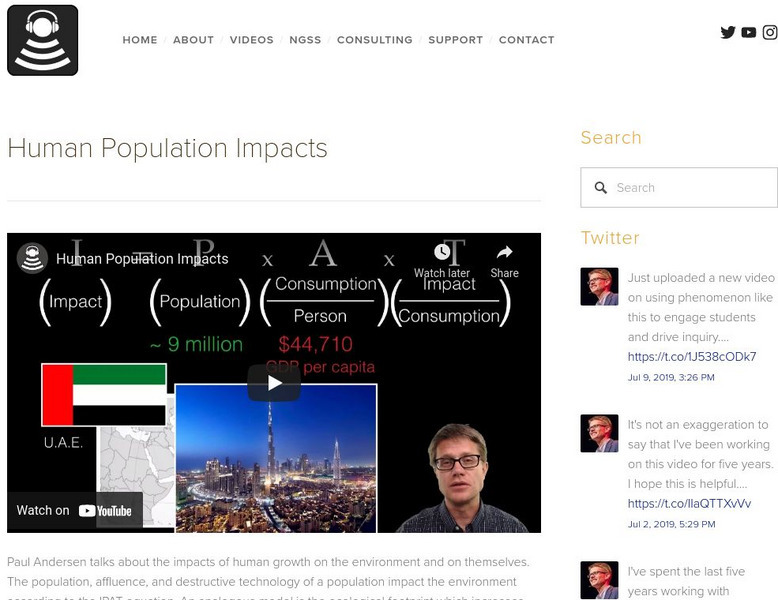Science ABC
Fermi Paradox Explained: If There Are TRILLIONS of Planets in Space, Why Hasn’t Anyone Contacted Us?
The Fermi Paradox refers to the apparent contradiction between the high probability of extraterrestrial life in the universe and the lack of evidence or contact with such civilizations. Named after physicist Enrico Fermi, the paradox...
Tarver Academy
Order of Operations with Exponents
In This Episode, Tyler Teaches Us About Order of Operations with Exponents
Khan Academy
Solving Rational Equations 2, Polynomial and Rational Functions, Algebra II
This video focuses on rational expressions and completes Sal's lecture series on working with and solving this particular type of equation. Its length would be ideal for a computer lab visit or homework assignment (in conjunction with a...
Khan Academy
Solving Radical Equations, Exponent Expressions and Equations, Algebra I
Continue your lecture on radical equations with this video, which features Sal solving a few more problems with his classic clarity and understandable way. Young mathematicians will benefit immensely from seeing his cool hand guide the...
Khan Academy
Solving Equations with the Distributive Property, Linear Equations, Algebra I
Here is an equation in which the first step is to use the distributive property to remove the parenthesis. Then, it is solved for the variables. Since variables are on both sides of the equation, it is important to verify the answer by...
Khan Academy
More Examples of Factoring Quadratics with a Leading Coefficient of 1, Algebra II
Focusing on the intuitive nature of algebra and factoring, Sal demonstrates how to factor quadratic equations efficiently. This video would be great to show in class after a lecture on quadratics or to assign in a computer lab (or...
Khan Academy
Parallel Lines From Equation, Mathematics I, High School Math
Here is a fairly basic video that uses three equations, each written in slope-intercept form, to determine whether the lines are parallel. Sal graphs each equation on the same coordinate plane to show how their slopes compare. The video...
Real Engineering
Boom: The Future of Supersonic Flight
Boom! Individuals watch a Real Engineering video to learn about current innovations in supersonic flight. The resource describes an airplane being developed by the Boom Technology company and compares its design to the Concorde.
Crash Course
How Not to Set Your Pizza on Fire: Crash Course Engineering #15
Add a little sizzle to your lesson. The 15th video in the Crash Course Engineering playlist looks at heat exchangers, including concentric tubes, finned tubes, plate heat exchangers, and shell-and-tube heat exchangers. It describes how...
Crash Course
Drugs, Dyes, and Mass Transfer: Crash Course Engineering #16
Mix a great resource in to your engineering repertoire. An engaging video discusses diffusion and mass transfer. It explains how a difference in concentration is the driving force for this mechanism.
Teach Engineering
Microfluidic Devices and Flow Rate
When you have to flow, you have to flow. The lesson introduces class members to microfluidic devices and their uses in medicine. They watch a short video on how the diameter affects the rate of flow. The worksheet has individuals...
Crash Course Kids
Engineering Games
Engineering is like a big game! Yes, you read that correctly. In this video, the engineering process is examined with a focus on defining variables, and ways to discover the one variable that affects the outcome of a solution....
GCFGlobal.org
Excel 2016: Creating More Complex Formulas
Please Excuse My Dear Aunt Sally! The 13th of 27 instructional videos from the Microsoft Excel 2016 set covers the order of operations. First, scholars review how to use the order of operations to solve math equations. Next, they see how...
Brightstorm
Dilations of Quadratic Graphs - Concept
Help learners recognize the characteristics of a quadratic graph and how changes affect them. An informative video uses a graphing calculator in order to find out what happens when the leading coefficient of a quadratic...
Khan Academy
Solving for F in Terms of C, Linear Equations, Algebra I
The instructor uses the temperature formula to illustrate how the variables can be manipulated to solve a problem.
Khan Academy
Recognizing Linear Functions, Linear Equations and Functions
Starting with a set of values for the x and y variables, this video shows how to tell whether these points determine a linear or non-linear function. Sal first defines linear functions in terms of the change in y over the change in x,...
Lesson Planet
EdTech Tuesday: AnimalWatch
Kids love animals, so encourage them to explore matches with animal-themed math. Jennifer and Rich present the app's features, spending particular time on how to use it and apply it to your classroom needs.
Real Engineering
Designing the Fastest Wheels in History
Record-setting cars need specially made tires. Young engineers watch a video in the Real Engineering series to learn about designing tires. Along the way, they study acceleration, inertia, and angular velocity.
Code.org
How Computers Work: What Makes a Computer, a Computer?
You see computers all the time, but do you really know how a computer works? The first installment of a five-part playlist explains the essential functions of a computer. The video describes, in detail, each of the functions: input,...
Khan Academy
Solving Percent Problems, Decimals, Pre-Algebra
Converting percents to decimals, and the other way around, can be tricky. Sal shows young mathematicians how to simplify this process with two sample equations and one word problem.
Bozeman Science
Bozeman Science: Human Population Impacts
Paul Andersen talks about the impacts of human growth on the environment and on themselves. The population, affluence, and destructive technology of a population impact the environment according to the IPAT equation. An analogous model...



















